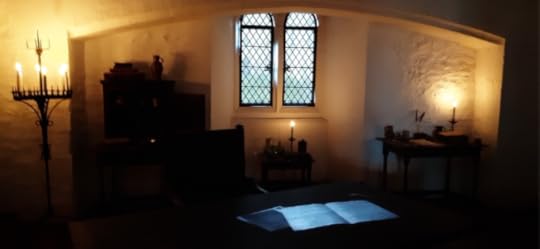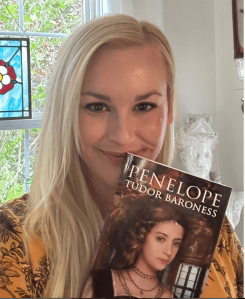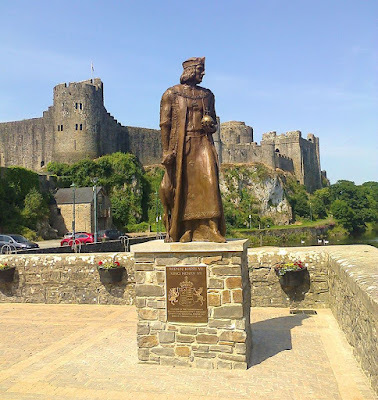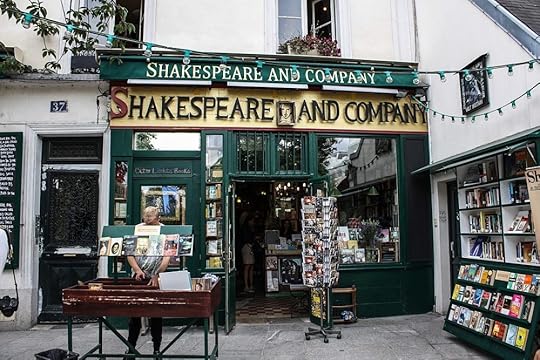Tracey Warr's Blog
September 16, 2025
Just Meandering – September issue
The latest issue of my newsletter is available with news on author events, audio books, bookshops, writing competitions and work in progress.
https://justmeandering.substack.com/p/just-meandering-6d8?r=1nlbpo
September 7, 2025
Castelloza, Trobairitz
I’ve just posted on Castelloza, the 13th-century trobairitz (female troubadour). It’s interesting what different interpretations there are of her work.
I’ve been posting for the last year on the Facebook group, France’s Splendid Centuries. Check them out for more posts on French history.
July 11, 2025
Viking Hostage
My latest France’s Splendid Centuries post focuses on Emma of Limoges who was kidnapped by Vikings.
July 9, 2025
Imagining medieval combat
My latest research post on a visit to medieval reenactors:
https://traceywarr.substack.com/p/stumps-of-lances-with-silken-streamers
May 20, 2025
Just Meandering – May issue
I’ve just posted the latest issue of my newsletter, Just Meandering, which includes:
a cover reveal for my new novel, Salt’s Wound, coming out in Novemberarticles on my recent research on medieval poisoning and morenews on bookshops stocking my novels in Walesan article on writing and gardeningand news of an author event in the UK in November.If you aren’t on my newsletter mailing list yet, you can sign up here:
May 8, 2025
The Elizabethans
I talked with historical fiction author Tony Riches about his latest book, Bess – Tudor Gentlewoman.
Forced to choose between loyalty and love, duty and desire, this is the story of Bess Raleigh, one of the last true Elizabethans.
 Buy the book
Buy the bookWhat attracted you to writing about this period of history, Tony, and why Bess?
After the success of my Tudor Trilogy I decided to tell the entire story of the Tudors, from Owen Tudor’s first meeting with Queen Catherine of Valois to the last days of Queen Elizabeth and the end of the dynasty. Rather than write one book about the complex queen, I decided to show her through the eyes of three of her favourite men. Sir Francis Drake worshipped her as ‘Gloriana’, the Earl of Essex was like the son she never had, and Sir Walter Raleigh was the Captain of her Guard.

While researching these I became intrigued by three Elizabethan women who witness and influence many of the great events of the era. I decided to make the Elizabethan trilogy into a series of six books, and chose Baroness Penelope Rich, elder sister of the Earl of Essex, his wife, Countess Frances, and Lady Bess Raleigh. Each had a very different relationship with the queen, and I liked the ways their lives intersected as their circumstances changed.
I only knew Bess as the loyal wife of Sir Walter Raleigh, but found her story intriguing. Unlike the others, Bess came from a troubled family. Like most Elizabethan women, her education was limited to what she might need to run a household. I was impressed at how her phonetic spelling didn’t stop Bess writing to the most powerful men at court, such as Sir Robert Cecil. Most surprising of all was her loyalty to her husband, despite his many flaws.
Did you do any ‘site-based’ research for Bess – going to places that feature in her story?
I enjoy visiting the actual locations in my books to have an authentic sense of what it must have been like to live and work there. As part of my research I visited her home at Sherborne in Dorset. The present owner of Sherborne, Lady Maria Wingfield Digby, kindly gave me a personal guided tour, including Walter’s study, which is not usually open to the public. I also visited Walter Raleigh’s cell at the Tower of London, and it was amazing to climb the stairs exactly as he and Bess would have done so many times.
 Inside Walter Raleigh’s cell at the Tower of London (author’s photo)
Inside Walter Raleigh’s cell at the Tower of London (author’s photo) How do you go about your world-building? Describing food, clothes and other aspects of Elizabethan life?
I’ve been ‘immersed’ in the Elizabethan world for the last six years, working on my Elizabethan series. I particularly like finding primary sources, such as letters, which can be great for understanding the time and place. I also have a wonderful collection of books covering everything from Elizabethan food to the intricacies of fashion.
What are the difficulties or advantages you found in writing in series?
One of the challenges is to avoid repetition, so I try to show big events, such as the Spanish Armada, through the eyes of each different character. An advantage of a six book series is having the scope to show how relationships and lifelong friendships develop and shift over many years.
Can you tell us about your publishing process?
I was thrilled to have my first publishing deal with a big commercial publisher, but soon became disillusioned when I found how little control I had over the process. They did minimal marketing and I had no idea of the results of my own efforts to raise awareness. It took over three years to ‘disentangle’ myself from my contracts, but now I have complete control over every aspect – and double royalties.
I found a great editor, and my wife is a thorough proof reader. I use a wonderful tool called Vellum, which imports my edited manuscripts and produces perfect eBooks and paperbacks with a few clicks. I also found great book cover artists and use ACX for my audiobook production.
 Ashley Risk, the artist behind some of my best covers
Ashley Risk, the artist behind some of my best coversDoes living where you do inspire your writing? If so, how?
I was born in Pembroke and still live twenty minutes from the magnificent castle where Henry Tudor was born. I’m also close to Carew Castle and Lamphey Palace, which feature in my books. I visit them regularly, so my writing is based on first-hand knowledge of the area. I also helped with the project to place a bronze statue of Henry, which has become a focal point for visitors.

What is the best writing advice you have to share?
People say they would like to write but never have the time. I once read that if you can write just one page a day, that’s a book a year.
Bess is the final book in your Tudor courtiers series. What’s next?
My last two books extend a little past the end of the Tudors into the rise of the Stuart dynasty, and I am now researching a new Stuart Trilogy, starting with a little known (and I think underestimated) Queen Consort, Anna of Denmark.
Congratulations on the new book and thank you for telling us about your writing practice.

Tony Riches is a full-time UK author of best-selling Tudor historical fiction. He lives in Pembrokeshire, West Wales and is a specialist in the history of the Wars of the Roses and the lives of the Tudors. For more information about Tony’s books please visit his website tonyriches.com and his blog, The Writing Desk and find him on Facebook, Twitter @tonyriches and Bluesky: https://bsky.app/profile/tonyriches.bsky.social. You can find out more about his research on his popular podcast series, ‘Stories of the Tudors’.
May 6, 2025
Medieval Poisons and Magic
I’m deep into writing Book 2 in the Trobairitz Sleuth series of medieval murder mysteries. I’ve been researching medieval poisonings in the British Library and medieval magic via Medievalists.net. My recent post on the poisons research is on Substack:
https://traceywarr.substack.com/p/the-poison-tree
You can read about Book 1 in the Trobairitz Sleuth series on Tony Riches’ Blog:
https://tonyriches.blogspot.com/2024/09/book-launch-guest-post-by-tracey-warr.html
And my latest post on France’s Splendid Centuries is about four powerful medieval women: Adela, countess of Blois; Ermengard, viscountess of Narbonne; and the 6th century Merovingian queens, Brunhild of Austrasia and Fredegund of Neustria, who are the subject of Shelley Puhak’s wonderful biography, The Dark Queens.
April 6, 2025
A Medieval Heroine in Cardiff
My trilogy of novels on Nest ferch Rhys has just arrived in stock at Book Space bookshop in Cardiff.

Book Space opened last year. The owner, Lily Baron, lived in the Shakespeare and Company Bookshop in Paris for a while (see my post https://shepherd.com/best-books/in-idiosyncratic-bookshops-and-lovely-libraries), worked in a bookshop in Bristol, and built the Book Space interior herself.
‘There is nothing like a book. Stories are what connect us to others,’ she says.

Nest ferch Rhys is one of the most famous medieval Welsh women. She had a turbulent life and lived in several Welsh castles. Her father, Rhys ap Tewdwr was king of Deheubarth and the last independent Welsh king. He was killed in battle against the Normans and Nest became a hostage. In my novels, I suggest that she was held hostage at Cardiff Castle by the Norman Montgomery family who had taken over her father’s kingdom (which covered modern-day Pembrokeshire and Carmarthenshire).
Nest became the mistress of the Norman king, Henry I. She was married to first one Norman knight and then another. AND she was kidnapped by a Welsh prince.
If that whets your appetite, go and search out my books at Book Space at 26a Crwys Road, Cardiff, CF24 4NL.
 DeFacto, CC BY-SA 4.0 https://creativecommons.org/licenses/by-sa/4.0, via Wikimedia Commons
DeFacto, CC BY-SA 4.0 https://creativecommons.org/licenses/by-sa/4.0, via Wikimedia CommonsRead more about Book Space on their website:
March 28, 2025
Female Lords: Adelaide-Blanche of Anjou
I’ve started posting a new series on medieval Occitan female lords on France’s Splendid Centuries. Here’s my first one on Adelaide-Blanche of Anjou. She wasn’t originally Occitan, coming from Anjou in the north, but she married with a series of Occitan lords and was regent for a couple of sons in the south. She was also (briefly) Queen of Aquitaine and played a part in the death throes of the Carolingian dynasty (the descendants of Charlemagne). She was the mother of Queen Constance of France, wife to Robert II, who was another very interesting medieval woman.
March 18, 2025
New Book Review – Women in History
A new review of Love’s Knife just published on Amazon emphasises the focus on women in history in my novel:
‘Warr skillfully immerses readers in the vibrant yet unforgiving world of a female troubadour, shedding light on a chapter of history where women’s stories are often overlooked. Through rich detail and keen historical awareness, she reveals a society where a woman without children can be confined to a convent and an heiress’s fate decided by a marriage against her will. Yet amid these harsh realities, Beatriz refuses to be subdued—sharp-minded, tenacious, and unwilling to accept the limitations imposed upon her.’
March is Women’s History Month and I am pleased to be contributing to re-assessment of medieval women through my fiction.
Thank you to the reviewer!



